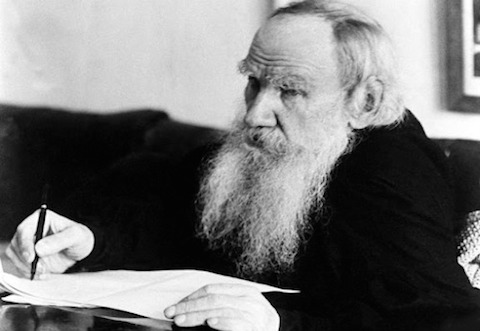1850 was a tough year for Leo Tolstoy. It was a time when his future successes were impossible to see while his past failures were all too obvious. A few years prior, he had been thrown out of the University of Kazan. His teachers wrote him off as “both unable and unwilling to learn.” Thereafter, he went into a spiral of dissolution, first in St. Petersburg and then in Moscow, where he drank, caroused and racked up some serious gambling debts.
Yet Tolstoy had ambitions beyond being just another debauched scion of the upper class. He struggled to improve himself. So he started a journal in 1847 while recovering in a hospital ward from venereal disease. Influenced by Jean-Jacques Rousseau, the future author of War and Peace sought to use the diary as a tool for self-exploration. For the first few years, he was an intermittent diarist. Then, in 1850, he took this tool to new lacerating levels. Part psychotherapy, part literary exploration, part inquiry into the limits of narrative and part straight up masochism, Tolstoy set out to account for his every action during the day in what he called the “Journal of Daily Occupations.”
He divided his page into two columns. In “The Future” column, he listed the things he planned to do the next day. In “The Past” column, he judges himself (harshly) on how well he followed through on those plans, labeling each one of his failures with the appropriate sin – sloth, avarice etc. There was no column for “The Present.”
You can see a selection from his journal, courtesy of scholar Irina Paperno, who wrote a nice piece on Tolstoy’s diary over at Salon. The diary entries below date from March, 1851:
24. Arose somewhat late and read, but did not have time to write. Poiret came, I fenced, and did not send him away (sloth and cowardice). Ivanov came, I spoke with him for too long (cowardice). Koloshin (Sergei) came to drink vodka, I did not escort him out (cowardice). At Ozerov’s argued about nothing (habit of arguing) and did not talk about what I should have talked about (cowardice). Did not go to Beklemishev’s (weakness of energy). During gymnastics did not walk the rope (cowardice), and did not do one thing because it hurt (sissiness).—At Gorchakov’s lied (lying). Went to the Novotroitsk tavern (lack of fierté). At home did not study English (insufficient firmness). At the Volkonskys’ was unnatural and distracted, and stayed until one in the morning (distractedness, desire to show off, and weakness of character).
25. [This is a plan for the next day, the 25th, written on the 24th—I.P.] From 10 to 11 yesterday’s diary and to read. From 11 to 12—gymnastics. From 12 to 1—English. Beklemishev and Beyer from 1 to 2. From 2 to 4—on horseback. From 4 to 6—dinner. From 6 to 8—to read. From 8 to 10—to write.—To translate something from a foreign language into Russian to develop memory and style.—To write today with all the impressions and thoughts it gives rise to.—25. Awoke late out of sloth. Wrote my diary and did gymnastics, hurrying. Did not study English out of sloth. With Begichev and with Islavin was vain. At Beklemishev’s was cowardly and lack of fierté. On Tver Boulevard wanted to show off. I did not walk on foot to the Kalymazhnyi Dvor (sissiness). Rode with a desire to show off. For the same reason rode to Ozerov’s.—Did not return to Kalymazhnyi, thoughtlessness. At the Gorchakovs’ dissembled and did not call things by their names, fooling myself. Went to L’vov’s out of insufficient energy and the habit of doing nothing. Sat around at home out of absentmindedness and read Werther inattentively, hurrying.
26 [This is a plan for the next day, the 26th, written on the 25th—I.P.] To get up at 5. Until 10—to write the history of this day. From 10 to 12—fencing and to read. From 12 to 1—English, and if something interferes, then in the evening. From 1 to 3—walking, until 4—gymnastics. From 4 to 6, dinner—to read and write.— (46:55).
Tolstoy’s regime of self-improvement wasn’t restricted to this punishing daily accounting of failures. He also kept a “Journal for Weaknesses,” which tallied up all of his moral failures, arranged in columns for laziness, indecision, sensuality etc., not to mention a series of notebooks for rules: “Rules for life,” “Rules for developing will,” and “Rules for playing cards in Moscow until January 1.”
One gets the sense that there’s a real opportunity for a line of Tolstoyan self-help books. Six Pillars of Self-Flagellation, perhaps? 7 Habits of Highly Effective Moral Failures? The Power of Spiritual Angst?
Read more about Tolstoy’s journaling over at Salon.
Related Content:
Find great works by Tolstoy in our collection, 800 Free eBooks for iPad, Kindle & Other Devices
Rare Recording: Leo Tolstoy Reads From His Last Major Work in Four Languages, 1909
Vintage Footage of Leo Tolstoy: Video Captures the Great Novelist During His Final Days
Leo Tolstoy’s Family Recipe for Macaroni and Cheese
Jonathan Crow is a Los Angeles-based writer and filmmaker whose work has appeared in Yahoo!, The Hollywood Reporter, and other publications. You can follow him at @jonccrow. And check out his blog Veeptopus, featuring lots of pictures of badgers and even more pictures of vice presidents with octopuses on their heads. The Veeptopus store is here.



In orthodox theology, these aren’t “sins” but “thoughts”. It may seem masochistic, but it looks like he is in effect documenting how his consciousness is distorting reality on a day by day basis.